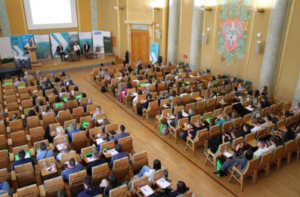At the end of 2020 the Polish Agency for Enterprise Development (PARP) announced a competition to select the operators of Poland Prize project and this competition was finished in the spring of this year. This program has been operating quite effectively: many operators has already started (and some of them even finished) first round of the recruitment process and are now conducting incubation and acceleration actions for startups.
The Poland Prize program aims at acquiring foreign idea-makers of innovative solutions for the Polish economy. The accelerators (program operators) search for such persons and encourage them to establish companies in Poland, as a next step in their business development. Such an idea worked well in Poland Prize pilot programme implemented in 2018-2020. The pilot edition helped to bring over to Poland many innovators coming from not only from Europe, but also from Asia or North and South America. In Poland Prize pilot program the financial incentive was up to PLN 250,000. A maximum of PLN 200,000 could have been received by a startup in a financial form (if the startup has positively implemented planned milestones) and the maximum value of PLN 50,000 in a form of advisory services. In the second edition of the Poland Prize program The amount of the support was increased. In first stage, a startup can get up to PLN 50,000 for so-called development stage that shall allow such a startup to start a company in Poland, reaching the stage of operability and establishing business relations with project partners: technology recipients or investors. If such relations are created, a startup – in accordance with its partner willing to cooperate with the startup – can further evolve its venture. Such a development is confirmed by three milestones that allow startup to get up to PLN 250,000, if properly implemented.
Therefore, the Poland Prize program seems to be an interesting and effective tool of support for entrepreneurs starting their business in Poland. This has already been proved by the example of the pilot edition, which was considered as a great start for at least dozen startups, which have gained a lot of recognition, and are now conducting very advanced activities in creating and commercializing their products. It also allowed to show Poland as a place that in many aspects is ready to adopt innovations, welcome foreigners and build economic relations.
The Program, however, also has some drawbacks that are not necessarily a consequence of wrong assumptions of the program itself, but the fact that entrepreneurs (especially the foreign ones) still meet barriers that ‘distract them’ from developing their enterprises.
First of these is the process of creating an enterprise. Poland Prize program is dedicated for foreigners, although they can also create a startup with Poles. It is important that at least one person without Polish citizenship is a member of the management board and has at least 50% of shares or stocks of the startup. The obvious simplest solution is establishing a company via eKRS system (so-called S24 companies) but it is not possible if the person does not have a PESEL number (and such are not available to foreigners who have not been associated with Poland so far). Thus, in this way, a foreigner (even with the participation of a Polish citizen as second shareholder) is not able to create a limited liability company nor newly introduced to the Polish law, existing from 1st July, a simple joint stock company (in Polish “PSA”), which was intended to be an optimal choice for startups. Data for July 2021 show that in the first month of PSA’s operation, only 39 such entities were created, while at the same time over 3,000 limited liability companies were created. One can still see the lack of trust in PSA, this company is not so ‘simple’ at all and entrepreneurs choose solutions that are well known and deeply rooted in the provisions of the Commercial Companies Code. PSA implements many solutions known especially in Anglo-Saxon or Western European countries and probably for many foreigners it would be a more “natural” choice, but for the above-mentioned reason, it is not possible to register in the eKRS system, thus they are not able to create such a company. As a result, they are left with a solution consisting in the acquisition of shares in already existing entities (e.g. companies established for this purpose by law firms).
The second problem is the fact that a company (startup) shall have a bank account in a Polish bank in order to receive a grant. Setting up a bank account is generally a simple process, although many banks have their own policy regarding this matter. Some do not set up, for example, bank accounts for entities ‘in organization stage’, while others for entities controlled by foreigners. Internal procedures as well as general branch regulations require banks to examine foreign members of companies’ bodies and shareholders more closely, especially those who come from countries of the former Soviet Union, some countries of Asia, Africa and South America. In addition to this, there are special procedures resulting from the treaties signed by the European Union (i.e. FATCA procedures). All these aspects can significantly delay the ability of the accelerator to make payments for the startups governed and controlled by foreigners and their ability to dispose those resources to develop their ideas.
The third drawback is the issue of the so-called soft-landing. In this way actions conducted for the benefit of the startup by a specific service provider were defined, as they allow foreigners to establish a company and emerge in Poland (e.g. help in residence permits, work permits etc.). If the party of the acceleration agreement is only to be an existing company (it is impossible to give a grant to an entity that does not yet exist), how to implement the process of assistance when setting up a company as a part of the soft-landing stage in accordance with law? In fact, all of these actions shall be conducted before the acceleration agreement is signed and only to a limited extend can be carried out after its conclusion. When remodeling the program, one could consider if such actions should not be the accelerator’s obligations, instead of an element of the grant (which finances these activities) implemented by a third party. The program is constructed in such a way that the grant is settled up in lump sum, on the basis of a budget, which will be dated to a date later than the date of many activities undertaken during the soft-landing.
Another drawback concerns the remuneration of a startup team members. At each stage of the startup’s participation in the program, the startup may provide in the budget, that part of the funds will be allocated to the salaries of team employees. These salaries shall be treated typically, i.e. as payment for work and in relation to perform contracts for specific work or contracts of mandate. Easy to imagine that one of the team members will be a person who requires a work permit to be formally involved in functioning of the startup and development of the solution. For such people, it would be a good idea to recognize that the functional remuneration (e.g. for performing functions as a board member) is a remuneration that can be financed from a grant. However, this matter has not been resolved yet, especially having in mind that definition of ‘personnel’ of the final beneficiary does not mention such gratification form for natural person by the entity obtaining public aid.
From the accelerator’s point of view, one of the indicators of the project is the number of startups that will finish the project by cooperating with the recipient of technology and who cooperated with the investor. During the project – without changing the co-financing agreement concluded between the accelerator and Polish Agency for Enterprise Development (PARP) – it is not possible to modify these indicators. Therefore, if the application submitted by the accelerator shows that 10 startups will co-operate with the recipient of technology, while another 10 with the investor, changing of this proportion (even if technology recipients are willing to co-operate with more startups, as they answer their needs) is not possible without PARP’s consent. This may significantly prolong the recruitment process, while at the same time it does not have an essential impact on the main goal of the project, which is to enable the development of startups in Poland to as many foreign-owned enterprises with good prognosis as possible.
The next issue is related to the fact that PARP allowed startups that have earlier took part in the Poland. Business Harbour program, the first edition of which was addressed to innovators from Belarus and the current one was extended also to people from Ukraine, Republic of Moldova, Federation of Russia, Georgia and Armenia, to participate in this program. Unfortunately, the list of startups that participated in this program and information about entities (Polish companies) established by innovators participating in the program is not publicly available. This makes it more difficult to verify during the recruitment process, whether the entity (existing, for example, since 2020) can be a subject to incubation and acceleration activities under the Poland Prize program. This concept is also an exception from a main assumption of the program, which is to ‘attract’ (and thus to generate incentive effect) foreign persons to Poland, because obviously they and their capital companies already operate in Poland. This, in turn, causes another risk from the accelerator’s point of view, even though the possibility to support such entities after they started their endeavors in Poland is worth appreciating and thus include it in the tracking of transfer of public funds that stimulate innovativeness of the Polish economy.
These are only some of the challenges that arise in relation to the Poland Prize program. A desire to comprehensively support the entity from the moment when it is encouraged to establish business in Poland, through early ‘organizational’ stage of development, up to structured, verified co-operation with the target first customer or investor – although pleases from the perspective of using the experience of PARP and other institutions with public aid – at the same time results in some incoherency in solutions applied to this program, which could have been avoided by prior consideration of problems related to the participation of startups. Refining these elements would reduce the risk for accelerators, develop effective paths for solving some problems and facilitate co-operation between accelerator, startup, Polish Agency for Enterprise Development and project partners. We can only have hope that previous experience from the ScaleUp pilotage, the Poland Prize pilot and Measure 2.5 – Acceleration programs, as well as from current implementation of the Poland Prize program will provide knowledge to design and shape similar programs under the financial perspective for years 2021-2027 without raising the above mentioned doubts.










